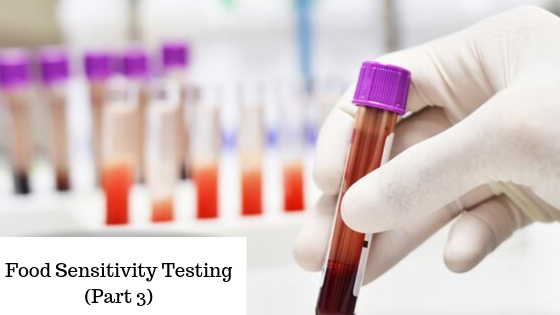|
I’m back for part three of my series on elimination diets! In Part 1 I explained what an elimination diet is and why it can be so effective at getting closer to the root cause of your symptoms, and in Part 2 I reviewed the top foods that should be eliminated and where to start based on your current health. The topic of food sensitivity testing gets brought up a lot when working with clients. Here are a few key points to consider when it comes to testing that can help you decide if it’s right for you in your health journey, when it’s suggested to test, and my preferred labs for testing. What exactly is a food sensitivity and how can you test for it? A food sensitivity is very different from a food allergy. Food allergies can be grouped into two general categories: IgE-mediated and non-IgE-mediated. The IgE-mediated reactions trigger an immediate response and arise up to 2 hours of ingesting the food. 1 Symptoms are extreme and sometimes life-threatening and can include tingling of extremities, wheezing, coughing, tightening of the throat, nausea, abdominal cramps, and diarrhea. 2 Food allergies are often easy to identify and can be confirmed with the use of a skin prick test or measuring IgE antibodies to that particular food. These results are very often reproducible when tested. Non-IgE-mediated reactions are delayed food reactions. These type of food reactions are what food sensitivities fall under. They are more difficult to diagnose because symptoms are often vague and can appear up to 3 days after ingestion of the offending food. For example, you may eat eggs on Saturday and experience joint pain on Tuesday. There are many symptoms of a food sensitivity, which I reviewed in part 1 of the series. Since there are no confirmatory diagnostic tests to diagnose these type of reactions, diagnosis is often based off history and resolution of symptoms with food avoidance. A delayed reaction can trigger IgG, IgA, and IgM reactions in your system. 3 Labs that do food sensitivity testing commonly use IgG and IgA antibodies. Food Sensitivity Testing No food sensitivity test is perfect. This is why the gold standard for identifying food sensitivities is not actually through any specific lab, it’s by doing a very strict elimination diet as it is the most accurate way to test your tolerance against a food. However, that's not to say that you shouldn't consider testing for food sensitivities. Here are a few things to consider when looking for a lab to test. Foods in their raw form can have a different effect on someone vs if that food had been cooked. Researchers have demonstrated that during food preparation, cooking and processing, chemical/molecular changes occur. 4 Many food sensitivity tests use IgG antibodies tested against raw food antigens only. So it’s quite possible that you could get a false negative test if the lab is not testing both raw and cooked foods. For a test to be accurate, you want it to be consistent and be able to have reproducible results. Does the lab run samples twice to ensure results are consistent and reproducible? The lab that meets the above criteria that I am confident to use in practice is Cyrex Labs. When should you test? I suggest testing after you have already done an elimination trial of some of the top foods known to cause a reaction like gluten, dairy, and eggs and if you continue to experience symptoms. Further, just because testing can be helpful in narrowing down other potential trigger foods doesn’t mean you should jump to testing right away. In fact, if you do a food sensitivity test that is measuring against a large list of foods while you have many symptoms and/or a chronic illness like an autoimmune disease, there is a greater chance for the results to not be as accurate. For instance, you test against 80 food antigens and 20 or more of those foods come back positive. Do I suggest you eliminate all of them? Not necessarily. This could be reflective of leaky gut, so it may not be necessary to remove all 20, just the top ones that you know you likely are reacting to along with the top offenders like gluten and dairy and begin a protocol to start healing your gut. Studies have demonstrated an association between increased intestinal permeability and the development of new-onset food allergies. In one study, this was observed in patients following liver and heart transplantation. Transplant patients that were on the immunosuppressant tacrolimus have been shown to have increased intestinal permeability and elevated levels of food antigen-specific IgE. Interestingly, some of these patients developed new-onset food allergies. 5 I never consider testing for food sensitivities in my client at the beginning because this is when they’re the most inflamed and symptomatic. I will typically reserve food sensitivity testing towards the end after we have explored other causes into their symptoms, such as pathogens, worked on healing their gut, and ruled out the top offending foods. Is food sensitivity testing necessary? Not necessarily. However, here are a few cases where it can be very helpful:
Further, many foods cross-react with gluten, and it can sometimes be very difficult for someone to eliminate all of these foods and then introduce each one back separately over a period of time. Cyrex, Array 4 not only tests for cross-reactive foods, but they also test for foods that are typically newly introduced on a gluten-free diet. For example, teff, sorghum, and buckwheat may cause some people’s immune system to react against the new food as if it were a foreign invader or due to overconsumption of these gluten-free foods. In either case, it’s not uncommon for someone to have additional sensitivities to foods when they have gluten sensitivity or Celiac disease and testing can be very helpful in getting these patient’s better. References
Comments are closed.
|
Hello!I'm Meagan Reynolds- a certified functional medicine practitioner and dietitian located in Nashville, TN. After overcoming my own health challenges with hypothyroidism, I was motivated to create my own practice where I help women reverse their thyroid, gut, and hormonal issues so they can reclaim their health. Archives
July 2023
Categories
All
|



 RSS Feed
RSS Feed